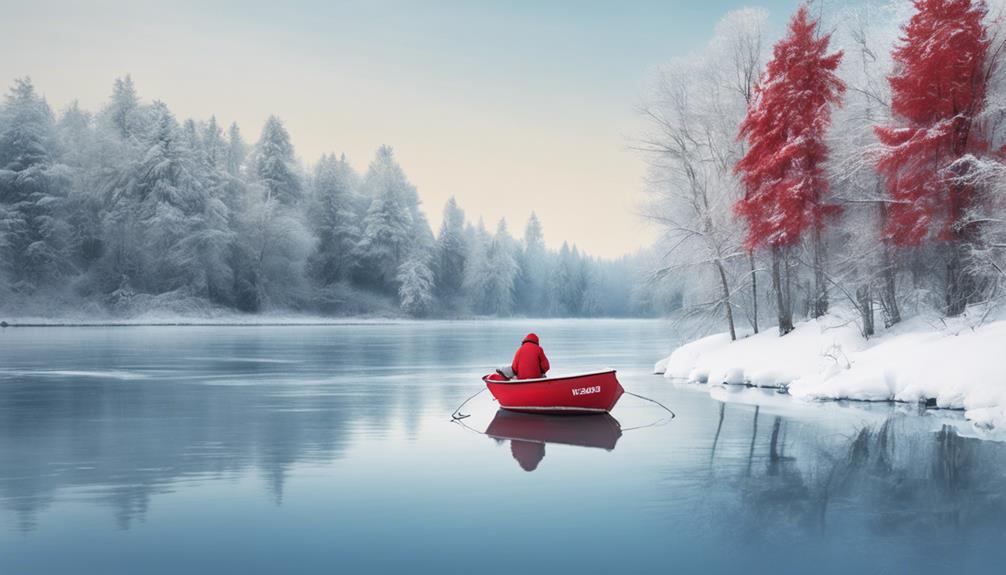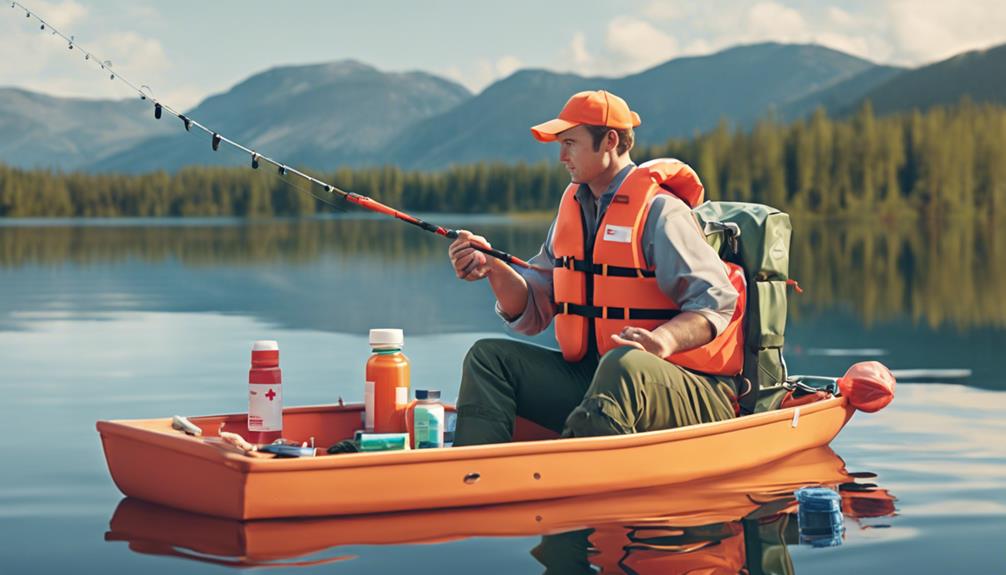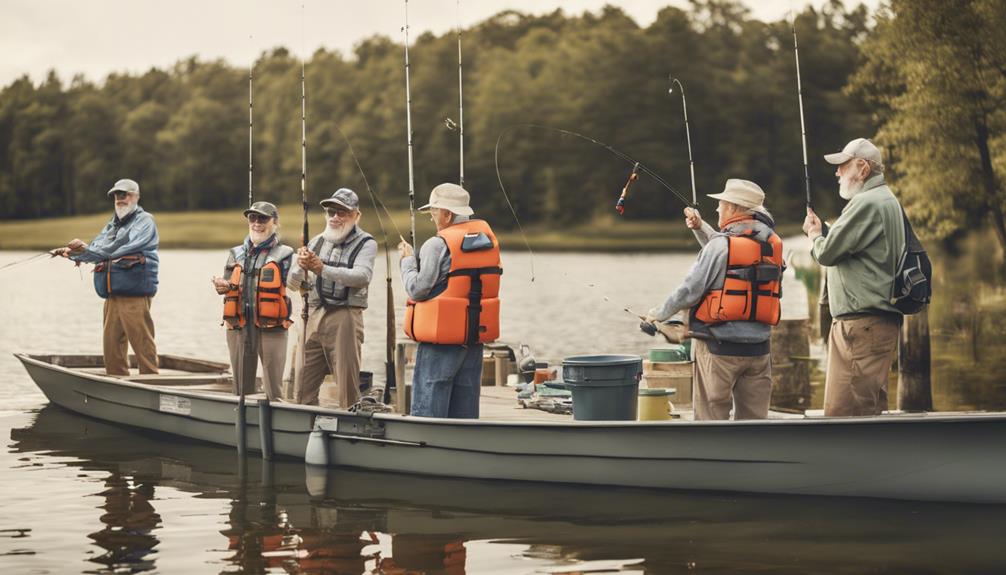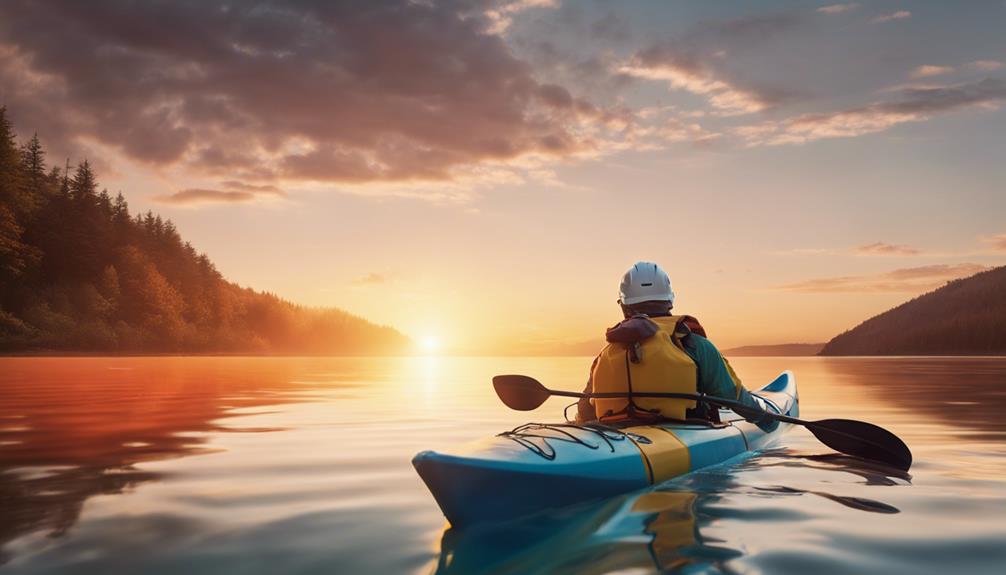You might think cold weather fishing isn't worth the trouble, but with the right precautions, you can enjoy this winter activity safely. Dressing in layers is key to retaining body heat and warding off the chill, but there's more to consider when venturing out onto icy waters.
Have you ever wondered how to properly prepare for unexpected emergencies while fishing in cold weather? Let's explore some essential tips to keep you safe and comfortable during your next frosty fishing expedition.
Dress in Layers for Warmth
To stay warm while fishing in cold weather, make sure you dress in layers. Start with a moisture-wicking base layer to keep sweat away from your skin. Thermal socks are essential to keep your feet warm and dry, preventing frostbite. Over the base layer, add an insulating layer like a fleece jacket to trap heat close to your body. Insulated gloves are crucial to protect your hands from the biting cold and wind.
Layering is key to regulate your body temperature as you move between different activities while fishing. When you're stationary, such as when waiting for a bite, you can add an extra layer like a down jacket to stay warm. However, when you're more active, such as reeling in a catch, you can easily shed a layer to prevent overheating and sweating excessively. This adaptability is essential to ensure your comfort and safety in changing weather conditions.
Remember to choose moisture-wicking materials for your clothing to keep sweat away from your skin. Wet clothing can quickly lead to hypothermia in cold conditions. By dressing in layers with thermal socks, insulated gloves, and appropriate base and insulating layers, you'll be well-prepared to stay warm and enjoy your fishing experience even in the coldest weather.
Use Proper Footwear
Proper footwear is essential for ensuring your comfort and safety while fishing in cold weather. When choosing the right footwear for cold weather fishing, focus on options that provide proper traction and insulation. Proper traction is crucial to prevent slipping on icy or wet surfaces, reducing the risk of falls and injuries. Insulated boots help keep your feet warm by providing a barrier against the cold temperatures.
Opt for boots with non-slip soles to ensure stability on slippery surfaces such as icy docks or wet rocks. Look for designs with deep treads that can grip onto various terrains, offering you stability as you move around. Additionally, consider boots with insulation to retain heat and keep your feet warm in chilly conditions. Insulated boots are designed to trap heat inside, preventing your feet from getting cold and ensuring your comfort throughout your fishing trip.
Remember to choose footwear that's waterproof or water-resistant to keep your feet dry and protected from any moisture. Wet feet in cold weather can lead to discomfort, frostbite, and even hypothermia. By selecting the right footwear with proper traction and insulation, you can enhance your fishing experience in cold weather while prioritizing your safety and well-being.
Stay Dry to Avoid Hypothermia
Ensuring you stay dry while fishing in cold weather is essential to avoid the risk of hypothermia. Wet gear and clothing can quickly lead to a drop in body temperature, increasing the chances of hypothermia setting in. To prevent this, investing in waterproof clothing is crucial. Waterproof jackets, pants, and gloves can help keep you dry even in wet fishing conditions. Additionally, consider wearing waterproof boots to prevent water from seeping in through your footwear.
When your clothing or gear gets wet, it's essential to change into dry clothes as soon as possible. Carrying extra layers in a waterproof bag can be a lifesaver in such situations. Remember that staying dry isn't only about the clothes you wear but also about your gear. Make sure your fishing gear is adequately protected from water to prevent it from getting wet and adding to the risk of hypothermia.
Before heading out for a fishing trip in cold weather, always check the weather forecast and plan accordingly. Knowing what weather conditions to expect can help you prepare better and ensure you have the right gear to stay dry and warm throughout your fishing adventure. By staying dry and prepared, you can enjoy a safe and comfortable fishing experience even in cold weather.
Check Weather Conditions Beforehand
Before heading out for a fishing trip in cold weather, make sure to check the weather conditions beforehand. This simple step can make a significant difference in ensuring your safety and overall enjoyment during the excursion. Here are some key points to consider:
- Gear preparation: Understanding the weather conditions will help you pack the right gear such as waterproof clothing, extra layers, and appropriate footwear to stay warm and dry throughout your fishing trip.
- Safety precautions: Knowing the forecasted weather will allow you to take necessary safety precautions like bringing along a first aid kit, wearing a life jacket if fishing on a boat, and informing someone of your fishing plans and expected return time.
- Stay updated: Weather conditions can change rapidly, especially in cold weather, so make sure to stay updated on any weather alerts or warnings issued for your fishing area.
- Plan your route: By checking the weather beforehand, you can plan your fishing route accordingly, avoiding areas prone to strong winds, heavy snowfall, or other hazardous conditions.
- Emergency protocols: In case of unexpected weather changes, knowing the forecast beforehand will help you react quickly and follow emergency protocols to ensure your safety and the safety of others.
Pack Emergency Supplies
When preparing for your cold weather fishing trip, remember to pack emergency supplies as a crucial part of your safety plan. In the unpredictable winter conditions, having the right gear can make a significant difference in ensuring your well-being. Emergency shelter is one of the essential items to include in your supplies. A lightweight and compact emergency shelter, such as a thermal blanket or a small tent, can protect you from harsh winds and provide insulation to retain body heat in case of an unexpected situation.
Additionally, communication devices are vital for emergencies. Make sure to carry a fully charged cell phone and a portable charger in a waterproof container. In areas with poor reception, consider investing in a satellite phone or a personal locator beacon (PLB) for reliable communication with emergency services. These devices can be lifesaving tools if you find yourself in trouble and need assistance quickly.
Know Ice Safety Guidelines
To ensure your safety while ice fishing, familiarize yourself with essential ice safety guidelines beforehand. When venturing out onto frozen lakes or rivers, knowing the ice thickness and taking appropriate safety precautions can prevent accidents and ensure a successful fishing trip.
Ice Safety Guidelines:
- Check ice thickness: Before stepping onto the ice, make sure it's at least 4 inches thick for safe fishing.
- Avoid risky areas: Stay away from cracks, edges, or areas with visible open water.
- Use safety gear: Wear a life jacket, carry ice picks, and have a rope handy in case of emergencies.
- Buddy system: Always fish with a companion and keep an eye out for each other.
- Inform others: Let someone know your plans, location, and expected time of return.
Stay Aware of Frostbite Risks
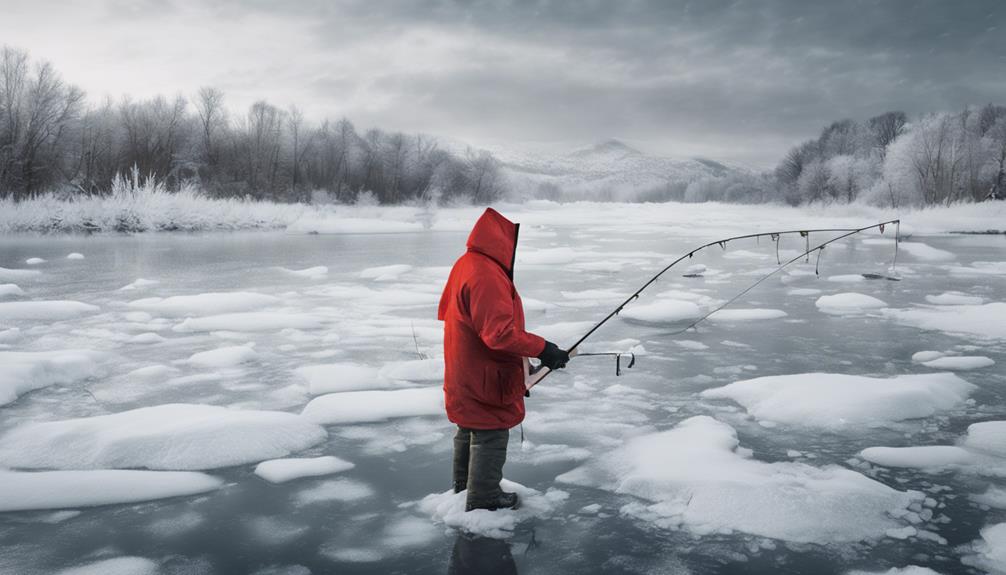
Be mindful of the risks of frostbite while fishing in cold weather. Preventing frostbite is crucial to ensure a safe and enjoyable fishing experience. To avoid this cold-weather injury, it's essential to dress warmly in layers, paying particular attention to protecting extremities like fingers, toes, ears, and nose. Make sure your clothing is dry, as dampness can increase the risk of frostbite. Wearing waterproof boots, insulated gloves, a warm hat, and a face mask can help prevent frostbite by keeping your body heat trapped and shielding you from the biting cold.
Recognizing symptoms of frostbite is equally important. If you start to experience numbness, tingling, or a stinging sensation in your skin, especially in exposed areas, it's crucial to take immediate action. Discolored skin, such as turning white, blue, or grayish-yellow, is a sign of frostbite setting in. If you notice any of these symptoms, move to a warm shelter, remove any wet clothing, and gently warm the affected areas. Avoid rubbing or using hot water, as this can further damage the skin.
Inform Someone of Your Plans
Before heading out for a fishing trip in cold weather, make sure to inform someone of your plans. It's crucial for your safety to notify friends or family members about where you'll be fishing and when you expect to return. In case of an emergency, having someone aware of your whereabouts can make a difference in getting timely help.
Here are some safety precautions to consider when informing someone of your fishing plans:
- Share your planned fishing location and route with a trusted person.
- Provide details about the equipment you'll be carrying and your means of transportation.
- Specify your expected return time so that someone can raise an alarm if you don't return as planned.
- Instruct them on who to contact, such as local authorities or emergency services, if they don't hear from you within a reasonable timeframe.
- Ensure that the person you inform is aware of the cold weather conditions you may encounter and knows how to assist you in case of an emergency.
Frequently Asked Questions
Can I Fish in the Same Spots During the Winter as I Do in the Summer?
You may need to change up your winter fishing locations compared to where you fish in the summer.
Winter brings about shifts in seasonal fish behavior, causing them to move to different areas for warmth and food.
Be prepared to explore new spots and adapt your fishing strategy to suit the changing conditions.
Keep an eye out for where the fish are congregating during the colder months to increase your chances of a successful catch.
How Can I Prevent My Fishing Gear From Freezing in Cold Weather?
To prevent your fishing gear from freezing in cold weather, consider gear insulation and weatherproofing. Proper storage solutions, like keeping your gear in an insulated bag or container, can help.
Regularly check and maintain your equipment to ensure it stays in good condition and functions well in the cold. By taking these steps, you can protect your gear and enjoy fishing even in chilly conditions.
Are There Any Specific Types of Bait or Lures That Work Better in Cold Weather?
When fishing in cold weather, tackle selection is crucial. The temperature impact can affect the performance of your gear. Opt for slow-moving baits like jigs or soft plastics that mimic natural prey in winter conditions.
These baits are more enticing to fish in colder water temperatures. By adjusting your bait preferences to suit the season, you can increase your chances of a successful catch during cold weather fishing trips.
Should I Bring Any Special Equipment for Ice Fishing, Even if I Don't Plan on Fishing on Ice?
If you're not planning to fish on ice, it's still a good idea to pack some winter clothing and safety precautions just in case. You never know when the weather might change, and it's better to be prepared.
Additionally, having some emergency supplies on hand can be helpful in unexpected situations. Remember to always prioritize your safety and be ready for any fishing techniques you might need in cold weather conditions.
How Long Can I Safely Fish in Cold Weather Before Needing to Take a Break to Warm Up?
You should be aware of how long you can fish in cold weather before needing a break to warm up. Fishing duration in cold weather varies based on temperature and wind chill.
To stay safe, take regular breaks to prevent hypothermia. Always prioritize safety precautions and listen to your body. It's crucial to recognize signs of cold stress and take warming breaks to avoid any potential risks.
Stay warm and enjoy your fishing experience responsibly.
Conclusion
Stay safe and warm on your cold weather fishing adventures by following these essential tips. Dress in layers, wear proper footwear, and stay dry to avoid hypothermia.
Check the weather conditions before heading out and pack emergency supplies just in case. Be aware of ice safety guidelines and frostbite risks.
Always inform someone of your plans before venturing out into the cold. Happy fishing!
